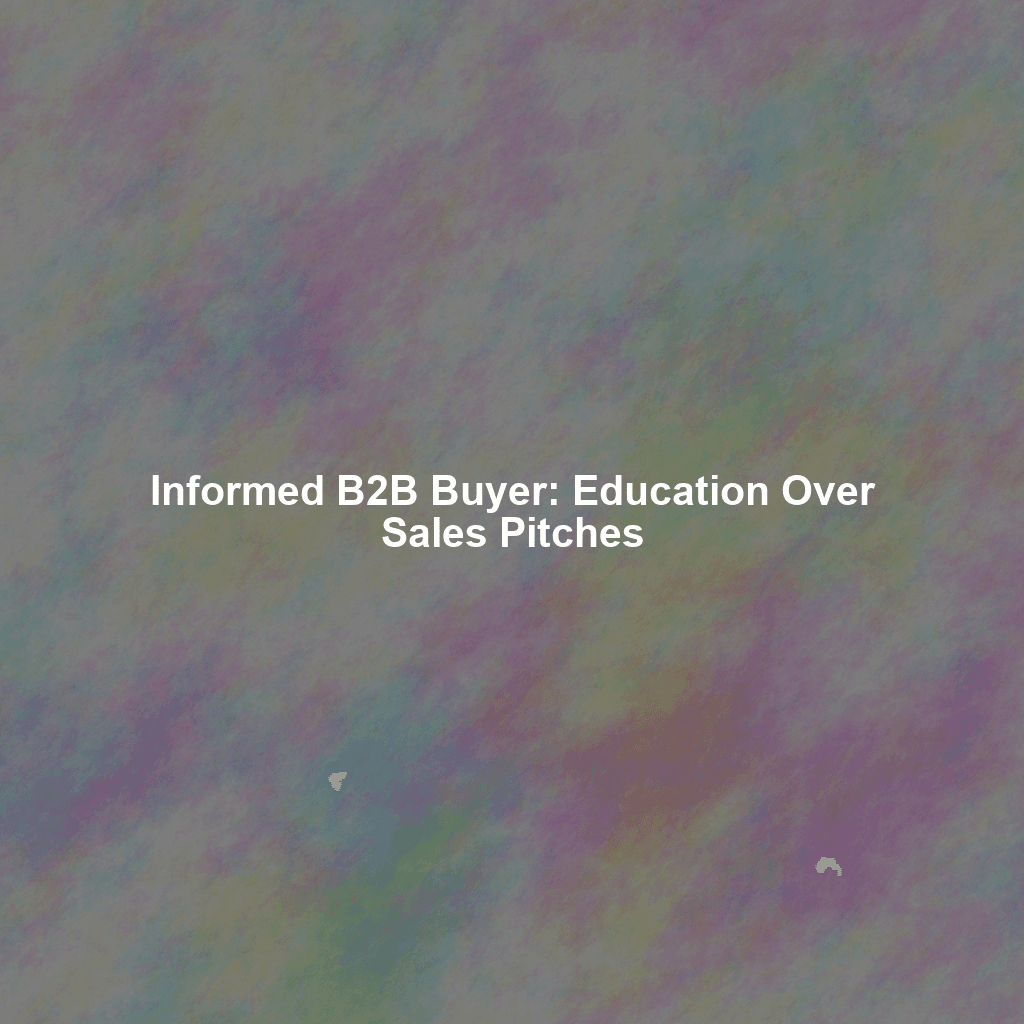The B2B sales landscape has undergone a dramatic transformation. The days of relying solely on outbound sales tactics like cold calling and generic email blasts are fading fast. Why? Because today’s B2B buyers are armed with something far more powerful than ever before: information. The readily available access to data online has created a new breed of buyer, one who is informed, discerning, and often, resistant to the traditional sales pitch. This shift demands a fundamental change in how B2B sales teams approach their prospects. Instead of pushing products, the focus must be on providing valuable education, building trust, and acting as trusted advisors.
The Declining Effectiveness of Traditional Outbound Sales
For years, outbound sales methods were the bread and butter of B2B revenue generation. However, several factors have contributed to their dwindling effectiveness:
- Information Overload: Buyers are bombarded with marketing messages and sales pitches from all directions. They’ve become adept at filtering out irrelevant or self-serving communications.
- Self-Service Research: Before even engaging with a salesperson, buyers conduct extensive online research. They consult industry reports, read customer reviews, compare solutions, and often have a clear understanding of their needs and potential solutions before a sales rep even picks up the phone.
- Distrust of Sales Tactics: Overly aggressive or pushy sales tactics are met with skepticism and resistance. Buyers are wary of being manipulated or pressured into making a decision.
- Increased Competition: The digital marketplace has made it easier for buyers to explore a wider range of vendors and solutions, making it harder for individual salespeople to stand out.
The Impact of “Cold” Outreach
Think about the last “cold” email you received. Did it feel personalized? Did it address a specific pain point you were experiencing? Or did it feel generic, automated, and ultimately, irrelevant? Most likely, it was the latter. These types of impersonal approaches are largely ineffective, and can even damage your brand reputation. Buyers are far more likely to engage with content and outreach that demonstrates an understanding of their business and their challenges.
The Power of Education-Based Sales
So, what’s the alternative? The answer lies in shifting the focus from selling to educating. By providing valuable, insightful content, B2B sales teams can position themselves as trusted advisors and thought leaders, building rapport and trust with potential buyers.
Content Marketing: The Foundation of Education
Content marketing is no longer a “nice-to-have”; it’s a crucial component of a successful B2B sales strategy. High-quality content can attract potential buyers, educate them about their challenges and potential solutions, and ultimately guide them through the sales funnel.
- Blog Posts: Share insights, best practices, and industry trends to establish thought leadership.
- Ebooks and Whitepapers: Offer in-depth analyses of specific topics, providing valuable information that buyers can use to make informed decisions.
- Case Studies: Showcase how your solution has helped other businesses solve similar problems.
- Webinars and Online Courses: Deliver interactive educational experiences that allow you to engage with potential buyers in real-time.
- Infographics: Present complex data in a visually appealing and easy-to-understand format.
Thought Leadership: Building Trust and Credibility
Thought leadership goes beyond simply creating content. It involves sharing unique perspectives, challenging conventional wisdom, and sparking conversations within your industry. By establishing yourself as a thought leader, you can attract a loyal following of potential buyers who trust your expertise and insights.
Consultative Selling: Understanding Buyer Needs
Consultative selling is a sales approach that focuses on understanding the buyer’s needs and challenges, rather than simply pushing a product or service. It involves asking insightful questions, actively listening to the buyer’s responses, and tailoring your recommendations to their specific situation.
Key aspects of consultative selling include:
- Active Listening: Pay close attention to what the buyer is saying, both verbally and nonverbally.
- Asking Probing Questions: Uncover the buyer’s underlying needs and pain points.
- Offering Solutions, Not Just Products: Focus on how your solution can help the buyer achieve their goals.
- Building Relationships: Establish a long-term relationship based on trust and mutual respect.
Making the Transition: Implementing an Education-Focused Strategy
Shifting from a traditional sales approach to an education-focused strategy requires a significant change in mindset and processes. Here are some key steps to consider:
- Understand Your Target Audience: Conduct thorough research to identify your ideal buyer persona, their challenges, and their information needs.
- Develop a Content Strategy: Create a plan for producing and distributing high-quality content that addresses your target audience’s needs.
- Train Your Sales Team: Equip your sales team with the skills and knowledge they need to become consultative sellers.
- Measure Your Results: Track your content’s performance and make adjustments as needed to optimize your results.
- Embrace Technology: Leverage marketing automation and CRM tools to streamline your content distribution and sales processes.
 Skip to content
Skip to content

